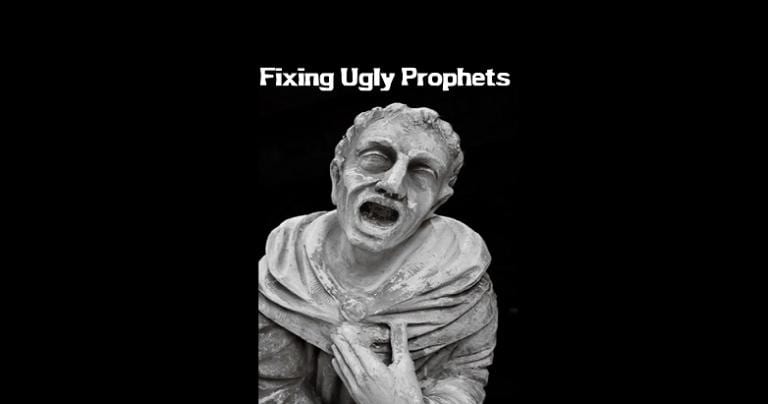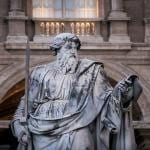
Prophets like Elijah get their ugly parts redacted in Mass readings.
The Prophets can be thought of as the Debbie Downers of the Bible. That’s true for even the greatest of Old Testament prophets, Elijah.
So once more, last Sunday’s readings (e.g., 1 Kings 19:9a, 11-13a) displayed how those who engineered the Common Lectionary have done another Frankenstein-style operation on the Bible. The result is likewise monstrous: the creation of new Scripture at the expense of murdering the old. That’s what happens folks when you slice and dice up the Bible, killing context. You get whatever the hell you want, except the real deal.
The Real Story of Elijah’s Low Point
The real story, as given by someone scholars have called “the Deuteronomist(s),” was different. Before 20th-century tinkerers came along and butchered it, Elijah, the great prophet of God encounters Holy and Absolute Mystery via an altered state of consciousness. In that older, uglier story, Elijah despaired. He was deeply discouraged. He wanted God to allow him to die (1 Kings 19:3-4). And God, in turn, rebuked Elijah (1 Kings 19:13b).
But that was not the first reading we received last weekend, on the 19th Sunday of Ordinary Time. Instead, we got the Joss Whedon version, something with more sunshine, zing, and artificial flavoring. The verses about Elijah’s despair and suicidal gloom are redacted—too much for us lay slobs, I guess, thought our “Superiors.” After surgery, Elijah becomes an example of trusting God, an intimate friend of God, to whom God freely speaks. He never doubts or despairs. And so God holds nothing back—God explains all the mysteries to him clearly, just like the Hierarchy does. Keep it clear, in Pleasantville black-and-white.
Was Horeb or Sinai the Mountain of Prophets?
The Deuteronomist(s) who put together this story originally wanted his Israelite readers to see similarities between Moses and Elijah. The Torah, or five books attributed to Moses (no, he didn’t really write them), is a hodgepodge of different traditions compiled, redacted, and edited after the Deuteronomist(s) (7th and 6th century BCE) had died. He and the Elohist (9th century BCE) called the mountain of God “Horeb.” This is in contrast to the Yahwist (10th-9th century BCE) and the Priest (“P” is also for “Persian,” 5th century BCE), who instead call it “Sinai.” But that editing was before the close of the canon, so it’s kosher, right?
But way after the canon was set, designers of the new lectionary saw fit to give us a superior canon, indeed, a canon-within-the-Canon. They’ll deny this if you ask them. But nevertheless, that’s what happened. Although they dump the gloom and God’s rebuke of Elijah, something essential to truly understand prophets, they keep the mountain! This is probably to artificially link the story with Sunday’s Gospel, Matthew 14:22-33. That’s the Matthean story about Jesus ascending the mountain to pray, and then walking on the Sea demon.
See that’s how typology works, folks. If it doesn’t fit, make it fit. Incidentally, popular Catholic fundamentalists like Scott Hahn adore the typology of Church Fathers. But they either forget or ignore the supersessionism and antisemitism that we inherit from those same Fathers and their typologies. It’s another edit, like with Elijah. Out of sight, out of mind. Just keep repeating, Catholics, “Everything’s perfect! We are the best!”
Pagan Origins of Last Sunday’s Psalm
That rule about making it fit also applies to last Sunday’s Psalm (Psalm 85:9, 10, 11-12, 13-14). Look at the language!
Canaanite mythology heavily influenced Israelite beliefs. Without this mythology, there would be no Psalm 85 as we have it. Each year, Canaanites celebrated Baal conquering Winter (really the personified Wet-Season of late October to mid-March). The personified Winter troubled and churned the Great Sea (Mediterranean). By defeating Winter, Baal ensured that Dry Season would be peaceful with good harvests.
Israelites took all that Canaanite mythology and swapped Baal for Yahweh. It’s Yahweh who did that. Keep in mind that the biblical world is one in which every effect has a personal cause. Therefore if something happens, the question was never WHAT happened, but rather WHO did it? You can’t say in Hebrew, “It rained.” Instead, it is, “God sent the rain.”
Again the creators of New Scripture (the Common Lectionary) murdered Scripture to make Scripture. The short verses of the Responsorial Psalm are embedded inside Israel’s lamentation, begging their Patron to restore the covenant. The people’s disloyalty and faithlessness upset that covenant, bringing creation to ruin, just like Winter does. Just as Baal, I mean Yahweh, restored and balanced creation in Dry Season, so he will also heal those who fear him and act justly.
Moses & Elijah, Twin Prophets
Back to Elijah and the First Reading. He is in terrible shame, and that is, for a Middle Easterner, a fate worse than death. He sits dishonored in a shallow cave. Wasn’t that just like Moses?—he too was in the hollow of the rock. God told Moses to rest there, you’ll recall, as his honor passed by.
As scholar John Pilch explains, the Deuteronomist(s) makes Elijah look and act an awful lot like Moses. Moses brokered the covenant between the Patron of Israel (Yahweh) and Israel (Yahweh’s client). So too must Elijah broker. Elijah must reestablish that covenant and restore the loyalty of Israel to their Patron.
Popular Christian imagination distorts prophets into Nostradamus-style predictors of later times. Because of this, Pilch reminds us that the real prophets were experts in God’s will for their contemporary times. Hence Pilch explains that the Elijah-Elisha stories demonstrate how the prophets responded to the needs of poor Israelite peasants who suffered under the tyranny of elites and the scarcity of drought and famine. Only loyalty to Yahweh will help, trust in kings will not. That sentiment likely reflects lost hopes in the Northern Kingdom about the Omri dynasty (880 BCE—873 BCE). Ultimately, kings will fail, but never Yahweh.
I wonder if American Christians, living through the Trump Virus, can find something in their lives relatable to this?












